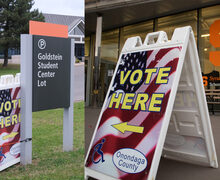Understanding the term “queer” fosters a safe learning space
Cassianne Cavallaro | Assistant Illustration Editor
“Queer” has a violent history of being a slur, and is fraught with negative history. However, it has an equally powerful history of being reclaimed as a term of rebellion and empowerment. While not everyone who is LGBTQ is comfortable self-identifying with the term, there are many others who claim the term proudly.
While LGBTQ individuals may be comfortable with other members of the community using “queer,” the issue becomes more complicated in the classroom, where the term is used academically.
Syracuse University has several classes labeled “QSX,” which stands for queer sexuality, as well as other classes that are not explicitly centered around the LGBTQ experience, such as some English and Textual Studies classes that discuss queer theory. One important aspect of the use of queer in the classroom is that “queer” has a sociopolitical meaning as well as an identity-related one.
“I use it in lots of different ways, not just as an identity category,” said Dr. Margaret Himley, Director of the LGBT Studies program and Professor of Writing and Rhetoric at Syracuse University. “It’s about Queer Nation, which is the first time the word came up in a kind of positive context which had to do with political activism during the HIV/AIDS epidemic.
Queer Nation was founded in 1990 by LGBTQ activists concerned with the HIV/AIDS epidemic, as well as homophobic violence and discrimination. Queer theory began to emerge in academia, Himley said.
While the term is rich with history, it can be hurtful when people use it without understanding the meaning behind it, even if they do not intend to be malicious.
“The risk, I think, is that there are people who are not in the LGBT, queer community who don’t understand the history of the word, and so they don’t know quite what they’re saying,” said Himley.
Even being part of the LGBTQ community does not guarantee using the word in a way that is not hurtful. What is comfortable for one person may be uncomfortable for the next. Ultimately, what is most important in the use of the term is respect and understanding. Himley said the word carries a history of violence.
Ultimately, proper and sensitive use of the term requires learning and expanding one’s understanding, which is exactly what a good college course has the potential to do.
Part of learning and growing includes making mistakes. The key is not to never make a mistake, but rather to learn through those uncomfortable experiences to become a more informed person.
“We learn, and we all screw up,” said Himley. “We do this in a calm, forgiving, and educational way. Because there’s a lot to learn.”
In order to get a quality education, it’s important for individuals to feel safe, and in order to achieve that safety, their personal boundaries must be respected. However, it’s equally important, particularly in the college setting, to expand our understandings of history, society, and of perspectives different than our own, and emphasize the importance of queer history and LGBT studies.
Through honest, open, and informative discussions, we can foster an environment that is both inclusive and revolutionary for people both inside and outside of the LGBTQ community.
Mallory Stokker is a junior magazine journalism major. Her column appears bi-weekly. She can be reached at mstokker@syr.edu. She can be followed on Twitter at @_malloryyrose_.
Published on February 9, 2020 at 11:38 pm





